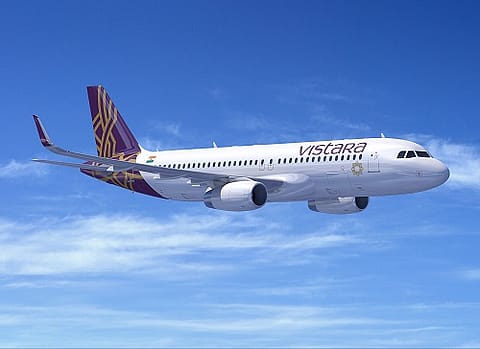Vistara inks $3.1 billion deal for 19 planes
The airline plans to launch international operations later this year.

Domestic carrier Vistara on Wednesday signed a $3.1 billion deal for 19 aircraft, the order being split between Airbus and Boeing, to add muscle to its operations.
Vistara—a joint venture between Singapore Airlines and the Tata group—has placed an order for 13 A320neo and A321neo jets from Airbus, and six ninth-generation 787 Dreamliners from Boeing. While the price of one A320neo jet starts at $111 million, the Dreamliners cost around $282 million apiece, according to Bloomberg.
“These orders are a landmark step in Vistara’s journey and demonstrate our deep-rooted commitment to contributing to the rise of the Indian aviation industry and to offering more choices to our customers,” Vistara CEO Leslie Thng said.
The full-service carrier has placed an overall order of 50 aircraft with Airbus, including the current order. The remaining 37 new aircraft from the A320neo family would be leased.
Similarly, with Boeing, Vistara has got the purchase rights for four more jets from the Boeing 787 family. The 787-9s are intended for use on medium-haul and long-haul international routes.
“India’s position as the world’s fastest growing domestic aviation market and its impressive growth in air passenger traffic that has more than doubled over the last decade, makes us confident of our aggressive plans for domestic expansion and international foray,” the Vistara CEO said.
“We are delighted to further deepen our relationship with Airbus and to join hands with Boeing to strengthen our modern and fuel-efficient fleet that will help achieve our thought-through ambitions,” he added.
Recommended Stories
It should be noted that the airline is planning to launch its international operations later this year, which explains its fleet expansion.
The Airbus aircraft, powered by Leap 1-A engines made by CFM International, are expected to be delivered between 2019 and 2023. Boeing’s Dreamliners, with General Electric’s GEnx-1B turbines, are scheduled to be delivered between 2020 and 2021.
Currently, the carrier has a fleet of 21 narrow-bodied aircraft—13 Airbus A320ceo and eight A320neo jets.
“Vistara’s order is line with the Centre for Asia Pacific Aviation’s (CAPA’s) FY19 outlook estimates. This order indicates long-term commitment to the market and the wide-bodied order reflects strong long-haul ambitions. We expect [the] four B787 options to be converted to firm orders in the near term and see another larger wide-bodied order in next one to two years,” said Kapil Kaul, CEO of CAPA, South Asia. CAPA is an aviation consulting firm.
(INR CR)
“Vistara will develop a strong regional and international network as well with the narrow-bodied fleet order,” he added.
Vistara is not the only Indian carrier to place such large orders. Jet Airways—India’s second largest carrier in terms of market share—placed an order for 75 Boeing 737 Max aircraft last week while budget carrier IndiGo plans to ditch its sale-and-lease option to own aircraft for its international operations.
“IndiGo will shortly announce a big wide-bodied order—possibly the biggest till date. See IndiGo is pursuing a very aggressive international strategy. SpiceJet, too, will be starting no-frills long-haul operations with leased wide-bodied aircraft,” Kaul said.
According to a CAPA note, India has the third-largest aircraft fleet with 1,053 jets, next only to the US (2,230 jets) and China (1,142 jets). India is expected to see new orders for around 100 wide-bodied aircraft in the next two years, indicating a strong international strategy. India currently has more narrow-bodied aircraft than China—912 against 764.